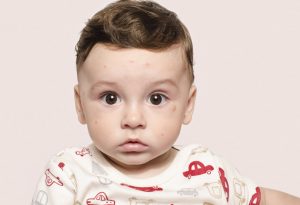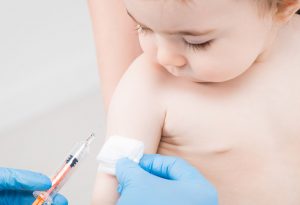In this Article
Children, especially infants are highly vulnerable to infections and susceptible to diseases. Since their immune system is still developing, they are at high risk of contracting contagious diseases and infection such as chicken pox and measles.
Getting your child vaccinated on a timely basis is the most efficient way of keeping infections at bay. If your child is not protected against measles and you notice rashes accompanied by symptoms such as fever and trouble in swallowing food, it can be an indication of measles.
What is Measles?
Measles which is also known as red measles or rubeola is a highly contagious respiratory disease which causes rashes on the entire body and is accompanied by symptoms such as a cough, high fever and running nose.
How does Measles Spread?
Being a highly contagious virus, measles spreads very easily. A patient suffering from measles is a breeding ground of the rubeola virus. The virus in the infected mucus droplets let out into the air after the patient coughs or sneezes, remains active for two hours and is likely spread to anyone who comes in the vicinity, or in contact with the surface which has this contagious mucus. Measles can also spread on sharing food items and liquids with a person infected with the virus.
Causes of Measles in Kids
As measles is highly contagious, kids can fall victim to the disease if they come in any form of contact with a person already suffering from it. Since this virus can spread through the air, a kid who is in the proximity of a patient who is coughing or sneezing can contract the disease. Children could also get infected by sharing food or drinks with the patient.

Symptoms of Measles in a Child
The appearance of rashes all over the body is the most obvious symptom of measles. However, rashes appear only four to five days after the appearance of the first, more general symptoms.
In addition to red rashes appearing all over the body, the symptoms of measles in a child include:
- High fever, which may run as high as 40 degrees Celsius .
- Running nose and cough.
- Swelling in the lymph nodes present in the neck.
- A sore throat.
- Redness in the eyes.
- Greyish white spots in the mouth and the throat.
In case the child is suffering from measles, red spots and rashes over the body will continue to appear even after other symptoms have toned down.
Diagnosis
The doctor will perform a diagnosis of measles if red spots or rashes are noticed on an ailing child’s skin. A simple saliva test or a blood test can confirm the presence of measles- causing virus in the body. If you notice the symptoms of measles in your child, you should consult a doctor immediately and get the necessary tests done.

Complications
While most children are likely to recover from measles without any further complications, there are chances that this condition may lead to other related problems. Some of the difficulties which are rare, but may be caused as a result of measles are as follows:
- Measles may lead to diarrhoea and pneumonia
- Hepatitis which is an ailment of the liver
- Myocarditis which is an inflammation of the muscle in the heart
- Meningitis which is an inflammation of the membranes of the brain and spinal cord
- Encephalitis which is an inflammation of the brain
Measles may also cause premature birth or miscarriage in a pregnant woman.
Treatment
There is no medication available to treat measles. Medication can be given to treat the symptoms associated with the infection. Here are a few remedies you may try and some precautions to keep in mind:
- Depending on the age of the child and prescription from the doctor, giving paracetamol or ibuprofen will reduce fever and provide relief from aches and pain.
- Ensure that the child drinks plenty of water to stay hydrated and avoid exposure to direct sunlight.
- Do not send your child to school for at least six to seven days from the appearance of the symptoms of measles. Ample rest should be given to the child so that the body can revive the damage caused by the virus.
- It is important to note that children suffering from viral illness should not be given aspirin as it can lead to the development of Reye syndrome.
- The red spots and rashes might cause a lot of irritation and create itching sensation. Do not allow your child to scratch on the rashes as this will increase the pain and can cause the spots to erupt.
Preventive Measures
The MMR vaccination is an effective preventive measure to protect against measles as well as rubeola and mumps. The question that is often asked is, can a vaccinated child get measles? The measles vaccination is effective to the tune of 95% in protecting against the virus. Also, the measles virus is non-recurring measles will never recur again once a person is infected with it.
In case your child is not vaccinated, ensure proper cleanliness in the surroundings and do not let your child come in contact with any person suffering from measles. Also, make it a point to use a hand sanitizer before you touch your baby or allow anyone else to touch her.
Also, a healthy diet should be a part of your child’s daily routine. This will improve their immune system and help the body fight against infections naturally.
Is Measles Vaccine a Live Vaccine?
The MMR vaccine, which is used to protect against measles is a live attenuated vaccine wherein a live virus is weakened and administered to the child. The weakened virus will replicate in the cells of the body and trigger a response from the immune system. This prepares the immune system to fight against the actual measles causing virus, thereby preventing the alien body from causing any damage.
Although uncommon, a child might suffer briefly from mild fever after receiving the vaccination.
When Can a Child Get Vaccinated for Rubeola?
The MMR vaccine is administered to children between the age of twelve and fifteen months. A repeat dosage of the vaccine is given again between the age of four and six years. This dosage is considered sufficient to provide life-long protection to the child from measles.
Children under the age of one are not administered this vaccination.

When to Seek a Doctor’s Advice?
You should seek your doctor’s advice if you notice the symptoms of measles, especially if your child is an infant. You should consult the doctor immediately if your child suffers from any of the following conditions:
- Dehydration
- Convulsions
- Drowsiness and high fever
- Trouble with breathing and feeling uncomfortable
Even if the symptoms are not very severe and do not point to the possibility of measles, it is best to consult a doctor to provide timely relief to the child.
Children, especially infants are highly sensitive to any infection causing agents. It is important to ensure that they are always in a safe environment which is free from disease-causing elements and are duly vaccinated in time. Inculcate healthy habits in your child as a part of their daily routine and emphasise the importance of personal hygiene at all times.
In case any member of your family gets infected with measles, make sure that your child does not come in contact with the person in any way, either directly or indirectly. Fulfilling your child’s basic dietary requirements will improve their immune system and help in keeping infections at bay.









